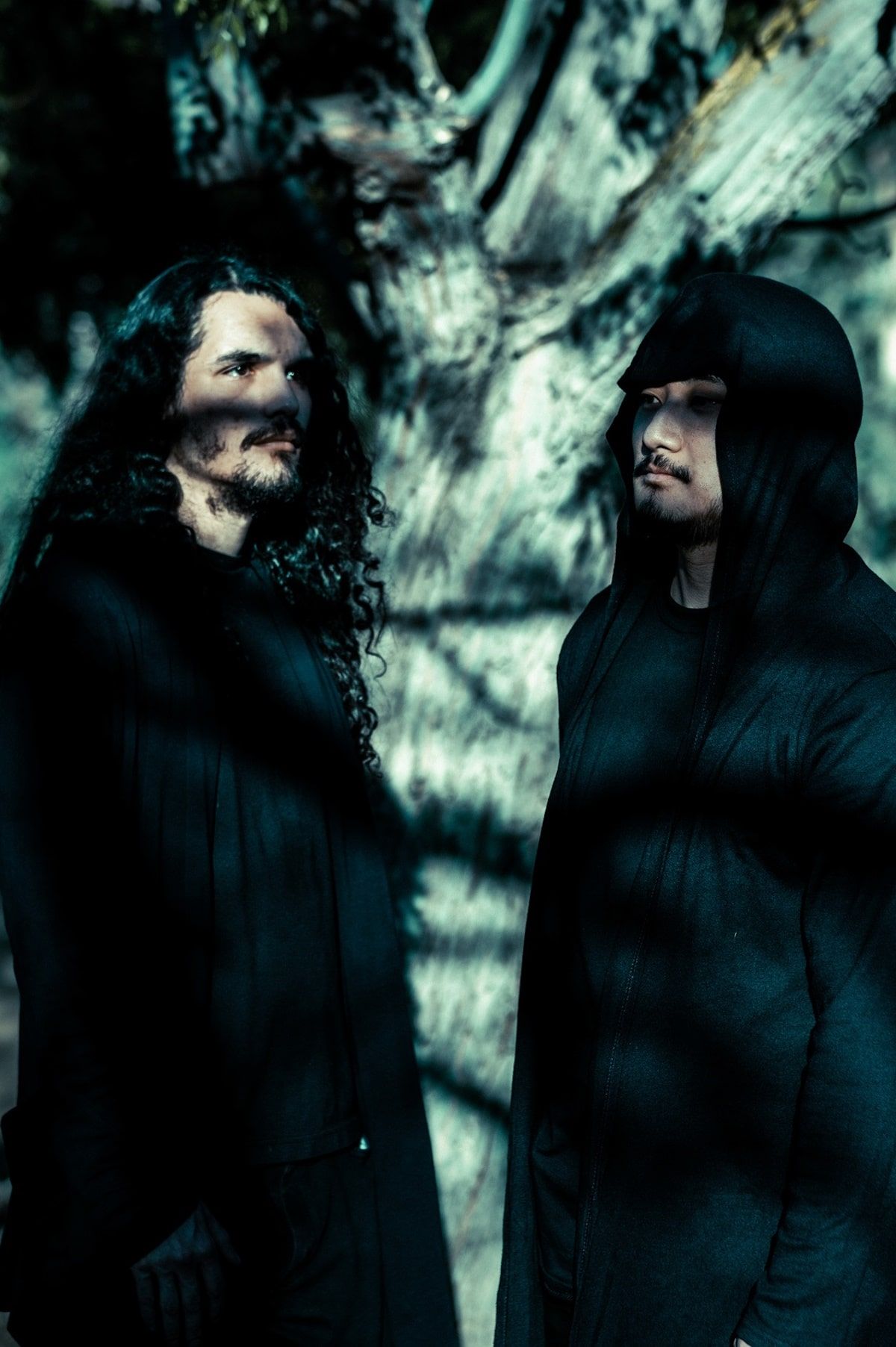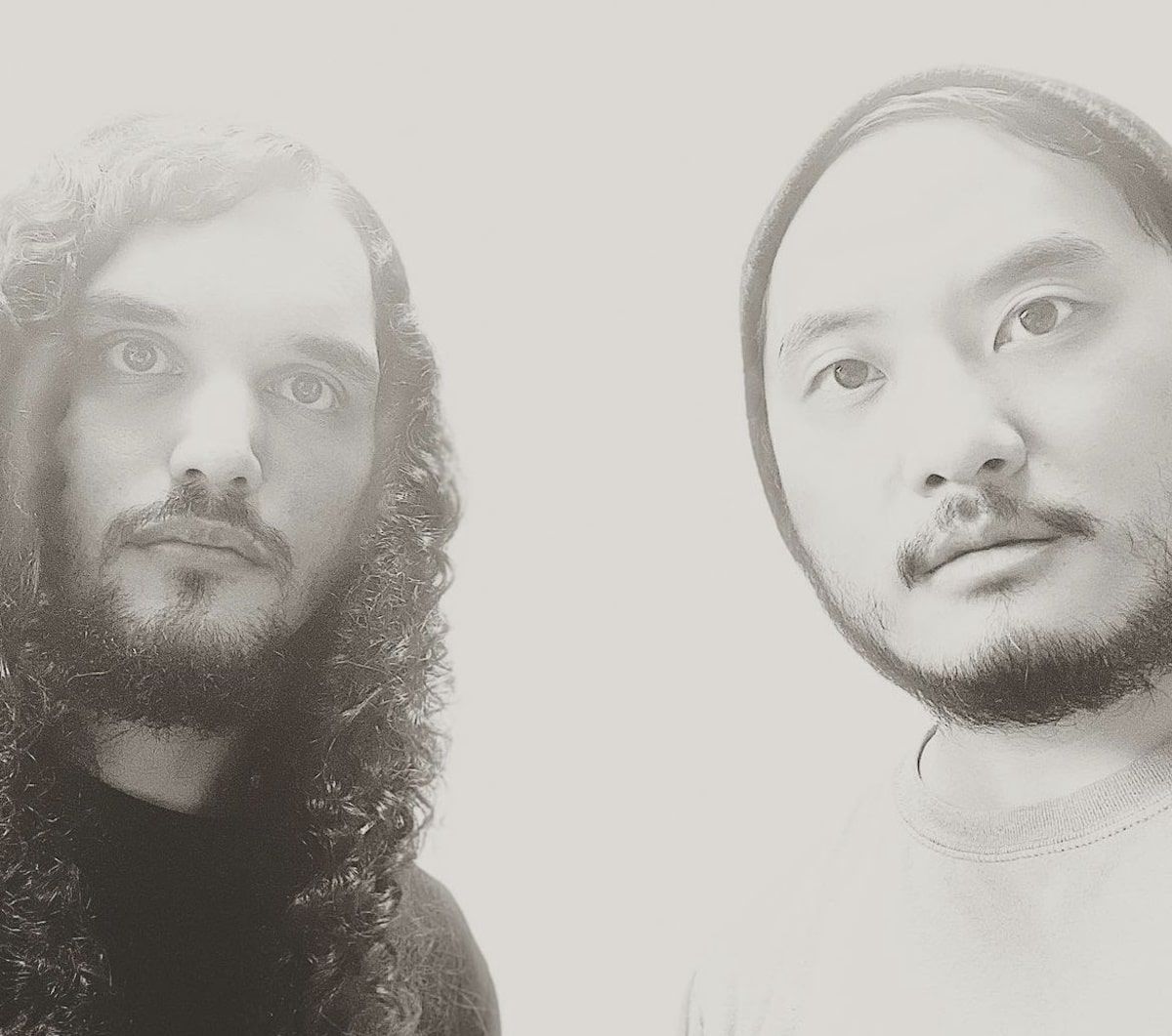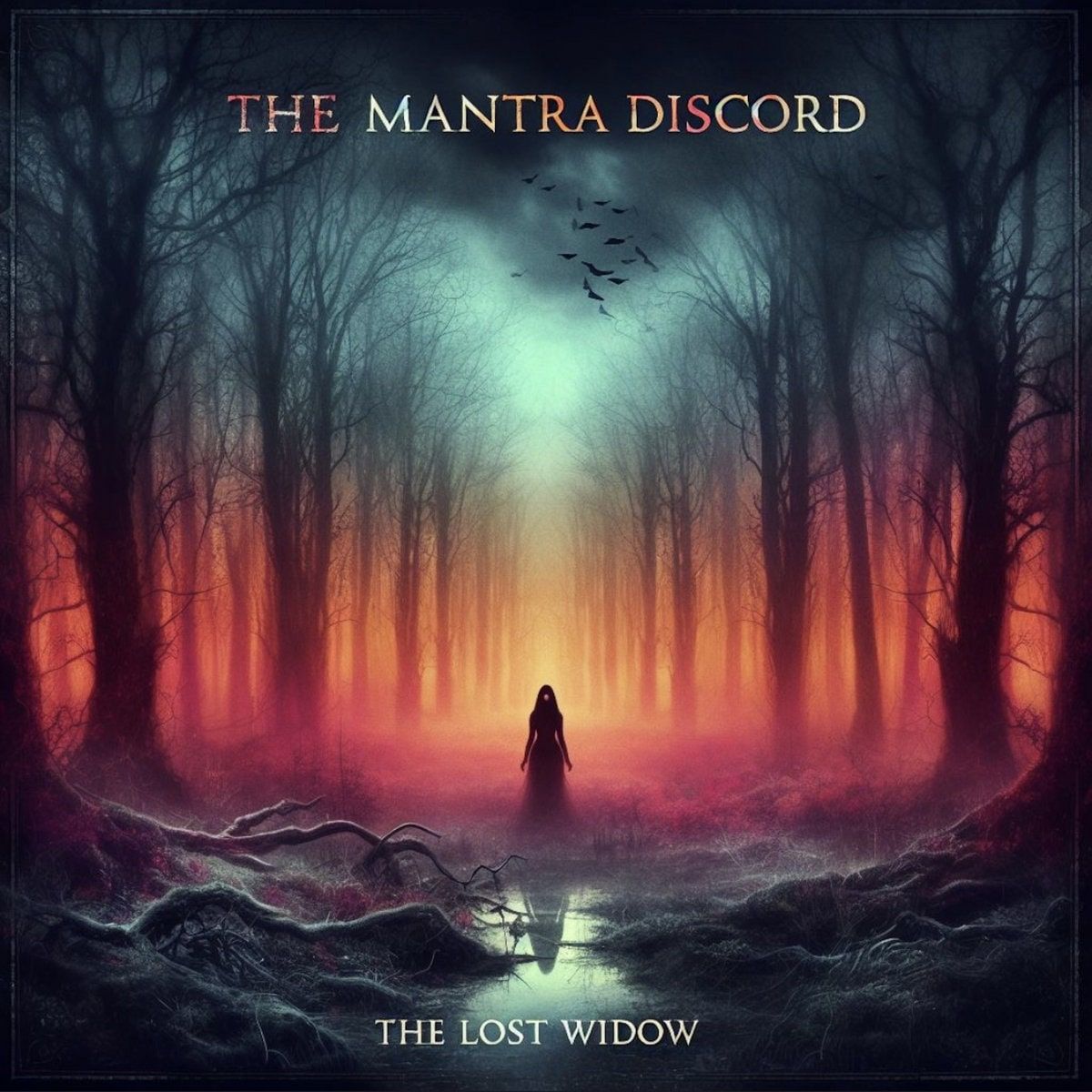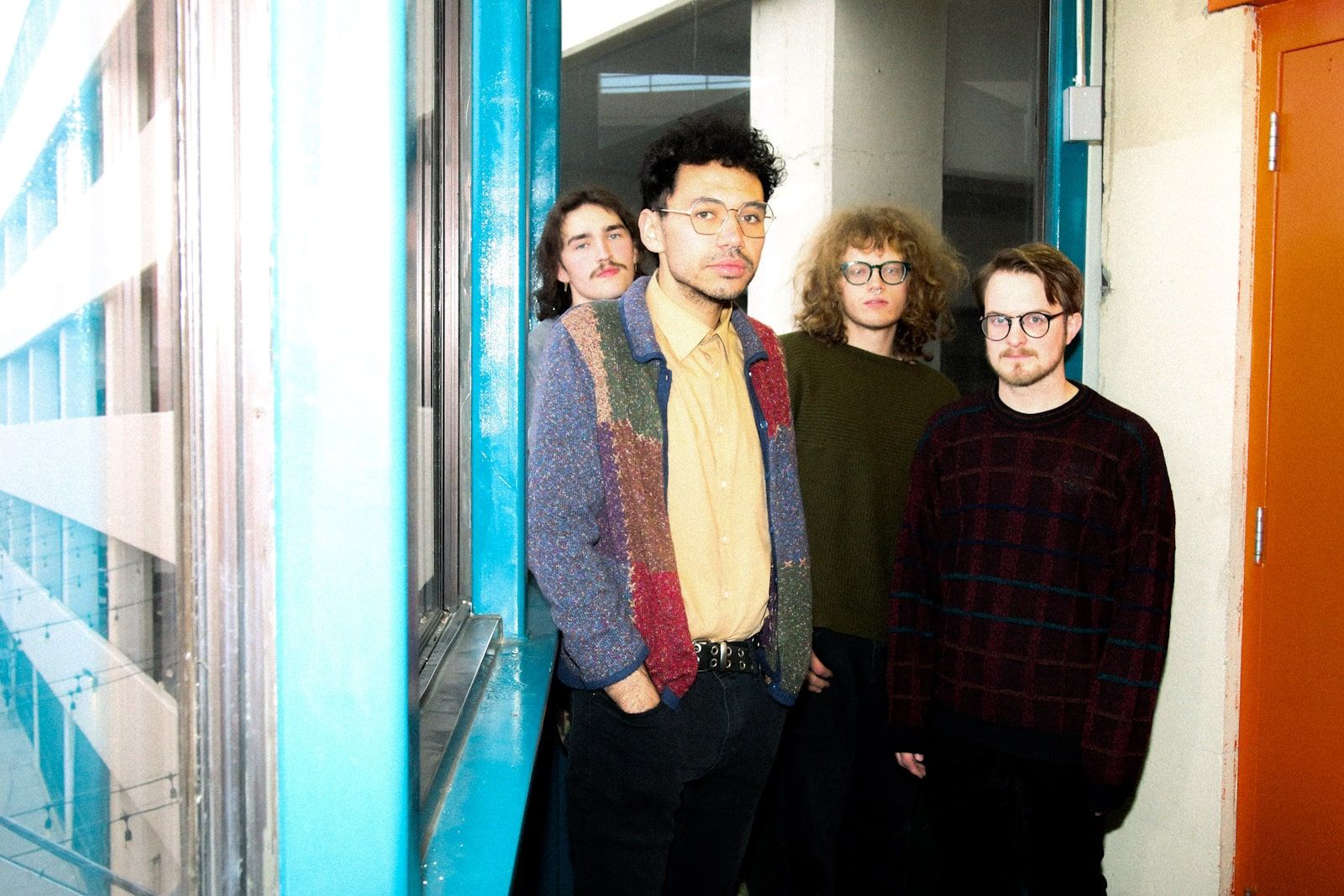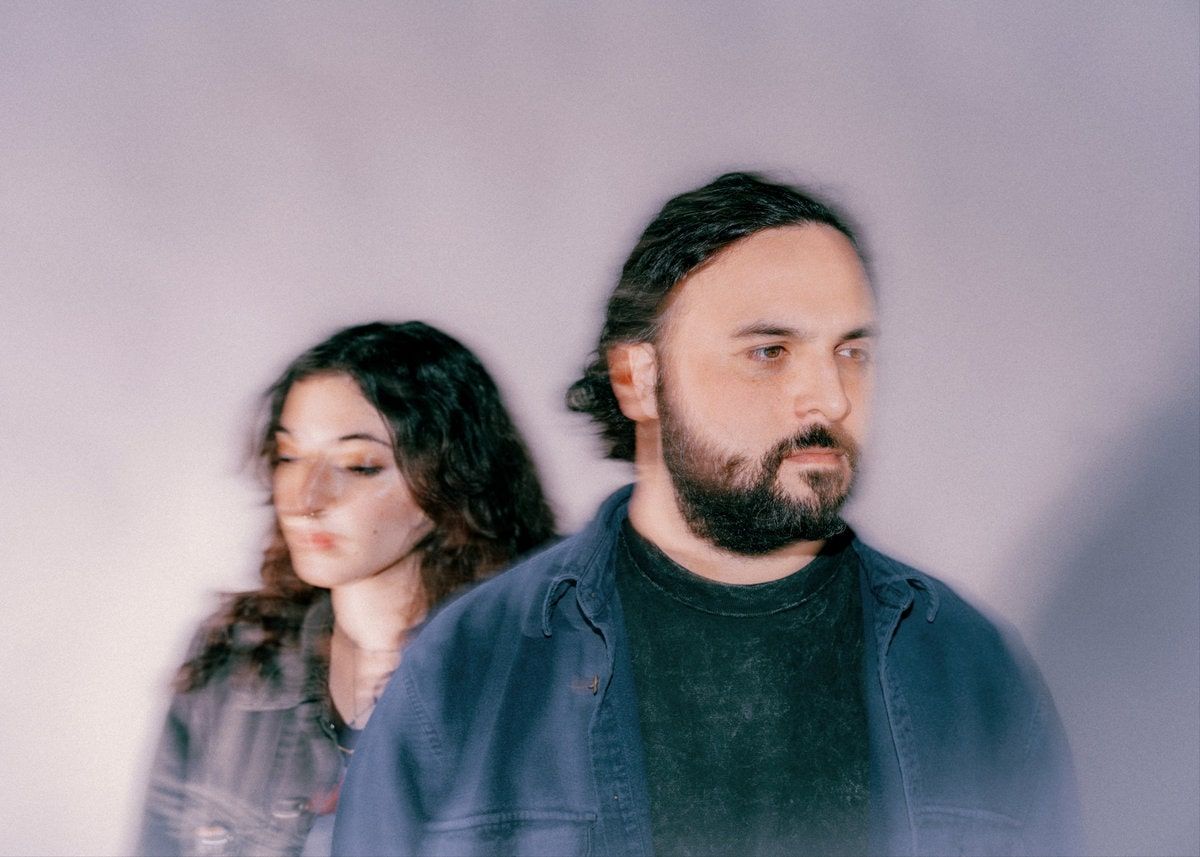Recently signed with Eternal Colossus Records, consisting of Jeremy Arcibal on drums and programming, and Russ Weisenthal on guitars, bass, and keys, Southern California progressive post rockers The Mantra Discord has released their new EP, “The Lost Widow,” on May 24th. This instrumental concept short story explores themes of hope, loss, resilience, and the power of human connection. We sat down with the band’s own Russ Weisenthal (co-songwriter, guitarist) to discuss their musical evolution, the creative process behind their latest release, and how they channel deep emotional narratives through their distinctive post-rock sound.
On the new EP, the band takes listeners on a journey through the emotional landscapes of inner strength and courage in the face of pain and heartache. “The Lost Widow” narrates three different paths one might take when dealing with loss.
The first path, “We’ll Find the Light in Darkness,” was released as a standalone single in August last year, marking the beginning of this journey. The EP continues with “Reach,” an ethereal ambient track about emerging from darkness and finding light, reminiscent of Hammock’s style. “Resting for Oblivion” delves into the grieving process and finding solace in seclusion, drawing influences from Explosions in the Sky and We Lost the Sea. This track is one of the darkest and most tragic pieces the band has created.
The final path, “Watching the World Fall Apart Together,” is about recognizing shared human experiences and finding spiritual strength together. This experimental track features contributions from Jason Keisling on synths and Sia of Atonalita on violin, and is dedicated to the late Ashley Owens of THE GLASS PAVILION.
Formed in early 2021, The Mantra Discord combines elements of dark, melodic post-rock and experimental jazz fusion. Their debut full-length album, “Relapse Into Silence,” was released in September 2022, showcasing their ability to handle all aspects of production despite limited resources. The experience shaped their sound and led to the refined and collaborative effort seen in “The Lost Widow.”
Here’s what Russ had to say about the band’s journey and their latest work.
Could you tell us more about how the band came together? What were your main inspirations and influences in forming this project?
The band officially came together and became active in Spring 2021. However, Jeremy and I have done other bands in the past since about 2008. At the time a lot of the inspirations were based on more instrumental projects like Polyphia, plini, Covet, etc. Jeremy and I had the same vision of going towards more of an instrumental project.
What lessons did you take away from your debut release in 2022, and how have these experiences shaped your new EP, “The Lost Widow”?
Reflecting on the whole creation process of ‘Relapse Into Silence,’ it’s clear that every step was a lesson in itself. Despite our initial lack of experience, we took on the daunting task of handling all aspects of production – from recording to mastering – with little guidance. Surprisingly, this endeavor began with a full album already in the works. However, upon the creation of the title track, the final piece of the puzzle, a tough decision was made to scrap much of our previous work and start anew.
This process spanned several months and, to be frank, the end results were far from stellar. The hurried pace and our limited resources led to a product that fell short of our aspirations. Nevertheless, the experience was invaluable. Feedback from fellow musicians shed light on both the pitfalls to avoid and the effective strategies to embrace.
Despite the challenges, I wouldn’t trade this experience for anything. It served as a trial for growth, shaping our sound and paving the way for what was to come. ‘The Lost Widow,’ marks a significant departure from our debut. Thanks to the collaboration of talented individuals such as Derrick Lin, known for his exceptional mixing on ‘We’ll Find the Light in Darkness,’ and Mike Kalajian from Rogue Planet Mastering, whose expertise we’ve long relied on, ‘The Lost Widow’ EP took on a new life. Their contributions not only refined our sound but also elevated it to new heights, embodying the spirit of collaboration and collective creativity.
How did you approach the shift to a more post-rock direction for this release?
The shift from our more progressive debut to going into a post-rock direction was a very gradual and natural approach. “Relapse Into Silence” was characterized by intricate, complex structures and a wide array of influences from prog-rock to math-rock. Each track on the album had its own unique style, which, while exciting, potentially perplexed some of our listeners.
When “We’ll Find the Light in Darkness” was being written it offered us a blank canvas. We traded complexity for simplicity, precision for spontaneity. The focus shifted from the cerebral to the visceral, from the mind to the heart. It became more about the overall flow of a song, rather than the intricate details that could fit into it. We experimented with different soundscapes, pushing our boundaries and challenging our own preconceptions. This is where we went into more post-rock territory. “We’ll Find the Light in Darkness” was our way of reintroducing ourselves and letting everyone know that some changes in our music have happened but it would be for the best. The EP is a continuation of our journey into instrumental post-rock and ambient music.
What was the creative process like for the title track, “The Lost Widow”? How did you incorporate the old school post-rock vibes into your sound?
“The Lost Widow” went through a lot of revisions before settling onto what it is now. The clean guitars came together very quickly along with the bass and fx. However, when it came time to record the overdriven rhythm guitars I kept changing up the patterns and couldn’t settle on one. For something that seemed so small, it honestly took the most amount of time. I ended up recording the lead guitar first and then recording the rhythm guitars over it. In the end, it finally all came together and we’re extremely happy with the results.
I wouldn’t exactly call them old school, but definitely an iconic post-rock band nonetheless. At the time, I was listening to a lot of If These Trees Could Talk, particularly their ‘Red Forest’ album. I really liked how a lot of the tracks went from being very subtle and clean to distorted and just the overall flow of the whole album. I definitely tried to incorporate that into the track as best as I could and wanted to also put our own flair to it as well.
Reach” explores coming out of the darkness and finding the light. What specific experiences or emotions influenced this track?
Right after our standalone single “We’ll Find the Light in Darkness” came out, I started writing for the EP but I felt the need to continue on with “We’ll Find the Light in Darkness” and this is where our lead single “Reach” came about. It was a more positive outlook and just being able to find hope within. It’s a belief in the possibility of better days, a testament to the human spirit’s ability to overcome adversity. The track is a reminder that you are not alone in your struggles and it’s coming to terms with being self-aware and acknowledging your feelings and finally being able to conquer them. The music of “Reach” is a mirrored reflection of how some things may take time to build into something bigger and better, even if you feel like things are stuck on a repetitive cycle. The track definitely means more to me than anything we have written so far.
“Resting for Oblivion” deals with the grieving process. How did you translate these themes of sorrow and beauty into the music?
The title of the track is a reflection of what happens when you decide to go the opposite direction and let your mind drift further into darkness. It is basically accepting your fate as some people become trapped in their own despair and misery and unfortunately cannot come out of it, as we have personally seen. The track was originally going to be called “We’ll Find the Darkness in Light” but obviously that didn’t happen.
The track itself is our most tragic and our darkest song we have done so far. However, it is also one of the quietest songs we have done and the beauty lies within the somber melodies. There is a huge sense of sadness throughout the whole track by using minor chords to help lay the foundation for the emotional landscape of the music.
“Watching the World Fall Apart Together” features contributions from Jason Keisling and Sia of Atonalita. How did these collaborations come about, and what did they bring to the track?
I first heard Atonalita when he collaborated with At the Grove on the track “Loners in the Universe.” It was a solid and melancholic track and I fell in love with Sia’s violin work.
The sense of urgency and the overall feeling of sadness in his playing is absolutely beautiful. It did also help a little that a couple months later we would sign onto the same record label as him, Eternal Colossus Records.
When “Watching the World Fall Apart Together” was coming together I wanted the guitars to sit back a bit and let the drums shine out. I remember listening to the rough guitar tracks and thinking that there should be more added to it and that’s when the idea popped into asking Sia if he would like to contribute to this track. I sent him what I could, which at the time was just the rough guitar tracks and within a few days he had sent me his violin tracks.
Jeremy and I were both astonished with how cinematic it sounded and how much of a positive difference it made the track. Jason Keisling was brought in directly after and after listening to his “Waves” EP we thought it would be really cool for him to add in some subtle background synth work and give the track a much more experimental feel. It is our longest track to date and one of the most funnest tracks we have ever created. It is also a very bittersweet track…
The final track is dedicated to Ashley Owens of THE GLASS PAVILION. Can you tell us more about your relationship with Ashley and the impact he had on your music?
I remember back in July of 2022 when he had released the “Consolation” album and it was featured on WherePostRockDwells youtube channel. I was very drawn to it and I loved the album and also the guitar work on it was phenomenal. I played it on a loop for at least 3 weeks straight. I really just liked the way it sounded all the way through.
I contacted him via instagram I believe and let him know that we had a debut release coming out in September that same year and would also be premiering on WherePostRockDwells. I really wanted to collaborate with him on one of our tracks but the track ended up not even seeing the light of day and went into obscurity. I was at work when I found out that he had passed away and it was extremely difficult to deal with and even come to terms with. I just couldn’t believe it to be honest with you, Ash and I didn’t know each other too well but through our music is how we made a connection. Not only did we lose an amazing musician but the world lost an amazing person.
In what ways do you see the different paths of dealing with loss, as depicted in your EP, being interconnected?
The paths are multifaceted, reflecting the complexity of the human experience in coping with grief, depression, and the whole thought process one can go through. The mind can become a very dark place and sometimes you feel trapped with no way out.
One overarching theme is the recognition that individuals navigate loss through diverse avenues, each path intertwined with others in a web of shared emotions and experiences. With our music, we hope to offer our listeners a space for reflection, healing, and ultimately, connection amidst the paths of loss and mourning and hopefully be able to conquer it.
How do you view the role of instrumental music in conveying deep emotional narratives compared to lyrical music?
In terms of our music it is basically being able to let the listener create their own visual imagery. With instrumental music you are free from the constraints of language and it communicates directly with our emotions. It’s a universal language that transcends cultural and linguistic barriers.
The rhythm, melody, harmony, and dynamics in instrumental music can evoke a wide range of emotions, from joy and excitement to melancholy and introspection. The absence of words allows listeners to interpret our music in their own unique ways, creating personal connections that are deeply subjective and individual. Both instrumental music and lyrical music have their own unique strengths in conveying emotional narratives.
Are there any specific post-rock or ambient artists that have significantly influenced your sound on this EP?
The Evpatoria Report and If These Trees Could Talk were definitely big influences for the sound of this EP.
Explosions in the Sky’s “So Long, Lonesome” and Hammock’s “I Can Almost See You” were basically canvases for the lead single, “Reach.”
What are your plans for promoting “The Lost Widow”? Any upcoming tours or live performances?
In the past we would have loved to go on tour and do some live performances. However, I think we are at a point now where our hectic schedules simply won’t allow for it. I mean never say never, something could happen later down the line but as of right now we are very happy just being able to release our music and just having people give us a chance to take a listen. A lot of the promotion will basically be done by promoting the EP release through youtube channels such as WherePostRockDwells and Worldhaspostrock and also by sharing via social media and hopefully word of mouth.
How do you see your sound evolving in the future? Any hints on what fans can expect next?
It’s hard to say for sure. Jeremy and I spoke yesterday about which direction to go into next and honestly the great thing about our band is that there are endless possibilities and there are absolutely no constraints.
We are definitely enjoying what we are doing now and the support we have received lately has been nothing but amazing. Only time will tell as we have always been open minded to trying new things when it comes to our creativity and music.



